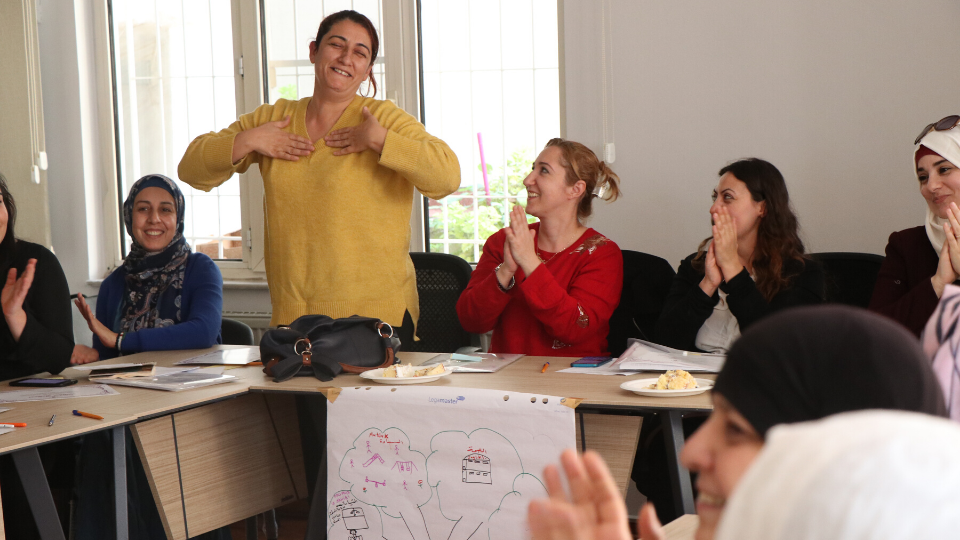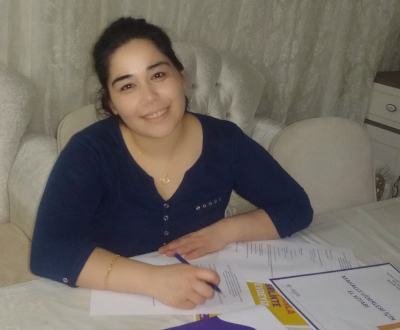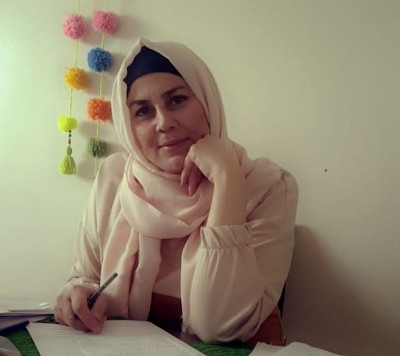Turkish and Syrian women manifest solidarity to respond to COVID-19
To circumvent lockdown and social distancing measures, a group of women call to check in on vulnerable Turkish and Syrian women and offer support.Date:

“Through phone calls, we learn about women’s problems and needs and refer them to the relevant institutions that can help. Later, we call them up again to see if their problems have been resolved and their needs met. Otherwise, we work more on their cases,” says Nigar Erdem, who is among 19 Turkish and Syrian women community leaders who have been trained in leadership, gender, need assessments, and available public services to help and empower vulnerable Syrian and Turkish women in their own communities.
These phone calls are part of the “Home to Home Solidarity Programme” jointly run by UN Women and the Foundation for the Support of Women's Work (KEDV). This program started at KEDV’s Women and Child Center in Gaziantep to support vulnerable Syrian and Turkish women to access healthcare, legal assistance, psycho-social and livelihood support. This project is supported through UN Women’s regional programme “Strengthening the Resilience of Syrian Women and Girls and Host Communities in Iraq, Jordan, and Turkey,” funded by the European Union, the EU Regional Trust Fund in response to the Syrian Crisis (the EU Madad Fund).

Before the lockdown, Erdem and her colleagues used to do home visits to check in on vulnerable women and facilitate activities so they could leave their homes and socialize. This also helped enhance social cohesion between refugee and host community women. Between December 2019 and April 2020, Erdem and her colleagues visited 764 Syrian and Turkish women. However, physical distancing and other measures to stop the spread of COVID-19 have made this difficult, so the women community leaders started using their phones to stay in touch with vulnerable women and provide help when needed.
So far, they have reached around 1,400 vulnerable women by phone to raise their awareness of COVID-19 and how to limit infection. They also help women in need get support through public agencies and institutions, including migration, labour, family and social affairs bodies as well as women’s shelters. “Since March, I have called around 80 women. We mostly talk about conditions at home, their needs, financial difficulties, COVID-19 and the increased housework burdens,” explains Erdem.

Najmat Alsabah Mustafa is a Syrian community leader woman. Like Erdem, she has made phone calls to around 80 women. “Through phone calls, I realized that the household chores of Syrian women have doubled during COVID-19. I talked to many women who are over 65 years old. They tell me how the situation has psychologically affected them. Through the solidarity groups, we support each other. Women talk about their needs and problems, and together we try to find solutions. We also share our own experiences and ideas on how to divide household chores among family members” explains Mustafa.
“Both Turkish and Syrian women are in a difficult situation. Many of them experience financial difficulties. If we do not support each other, no one can hear our voices. We work hard to make everyone’s voice heard.” says Erdem.
“As women, we are among the most affected by COVID-19 in our community. Because of community pressure, many cannot complain about their conditions. Thanks to the programme, we can reach women, and make sure their voices are heard by relevant institutions. When we support each other, we can overcome all challenges.” Najmat added.